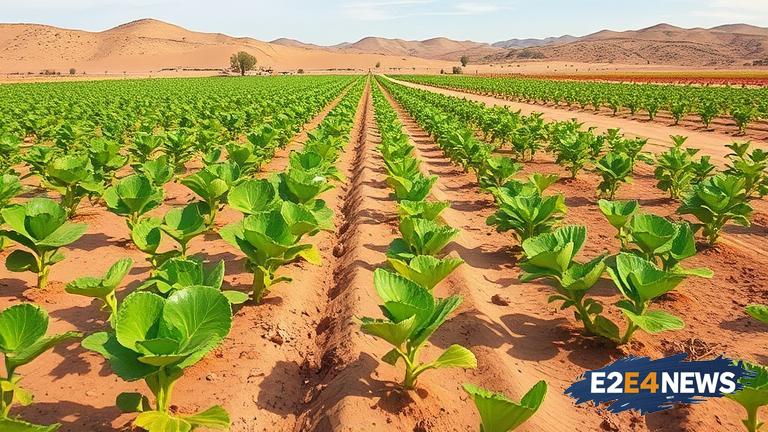Israel, a country known for its innovative approach to agriculture, has been making significant strides in desert farming. The country’s agricultural sector has been working tirelessly to develop and implement new technologies to increase crop yields and sustainability in the desert regions. One of the key techniques being used is precision agriculture, which involves the use of advanced sensors and drones to monitor and control crop growth. This approach allows farmers to optimize water and fertilizer usage, reducing waste and minimizing environmental impact. Additionally, Israeli farmers are utilizing advanced irrigation systems, such as drip irrigation, to conserve water and reduce evaporation. These innovative techniques have resulted in significant increases in crop yields, with some farms reporting yields of up to 30% higher than traditional farming methods. The use of greenhouses and other forms of protected agriculture is also becoming increasingly popular, allowing farmers to control temperature, humidity, and light levels to optimize crop growth. Furthermore, Israeli researchers are exploring the use of new crop varieties that are specifically bred for desert conditions, such as drought-resistant crops. These varieties are not only more resilient to extreme weather conditions but also require less water and fertilizer, making them a more sustainable option. The Israeli government has also been providing support for desert farming initiatives, offering grants and subsidies to farmers who adopt innovative technologies and practices. As a result, the country’s agricultural sector is experiencing significant growth, with exports of fresh produce increasing by over 10% in the past year. The success of Israel’s desert farming initiatives has also attracted international attention, with countries such as the United States, China, and India seeking to learn from Israel’s expertise. In fact, Israel has become a hub for agricultural innovation, with many international companies and research institutions establishing partnerships with Israeli firms. The country’s unique combination of innovative spirit, advanced technology, and favorable climate has created a thriving ecosystem for agricultural entrepreneurship. Moreover, the development of desert farming in Israel has also had a positive impact on the environment, with the use of sustainable practices and technologies reducing the country’s carbon footprint. The Israeli Ministry of Agriculture has also launched initiatives to promote sustainable agriculture, including the use of organic farming methods and the reduction of chemical pesticides. Overall, Israel’s innovative approach to desert farming is not only increasing crop yields and sustainability but also contributing to the country’s economic growth and environmental sustainability. With its strong focus on research and development, Israel is poised to remain a leader in the field of agricultural innovation for years to come. The country’s expertise in desert farming is also being shared with other countries, helping to address global food security challenges. In conclusion, Israel’s desert farming initiatives are a testament to the country’s innovative spirit and commitment to sustainability. As the global demand for food continues to rise, Israel’s expertise in desert farming is likely to play an increasingly important role in addressing this challenge. The use of advanced technologies, sustainable practices, and innovative crop varieties is not only increasing crop yields but also reducing the environmental impact of farming. With its unique combination of innovation, technology, and favorable climate, Israel is well-positioned to remain a leader in the field of desert farming for years to come.
